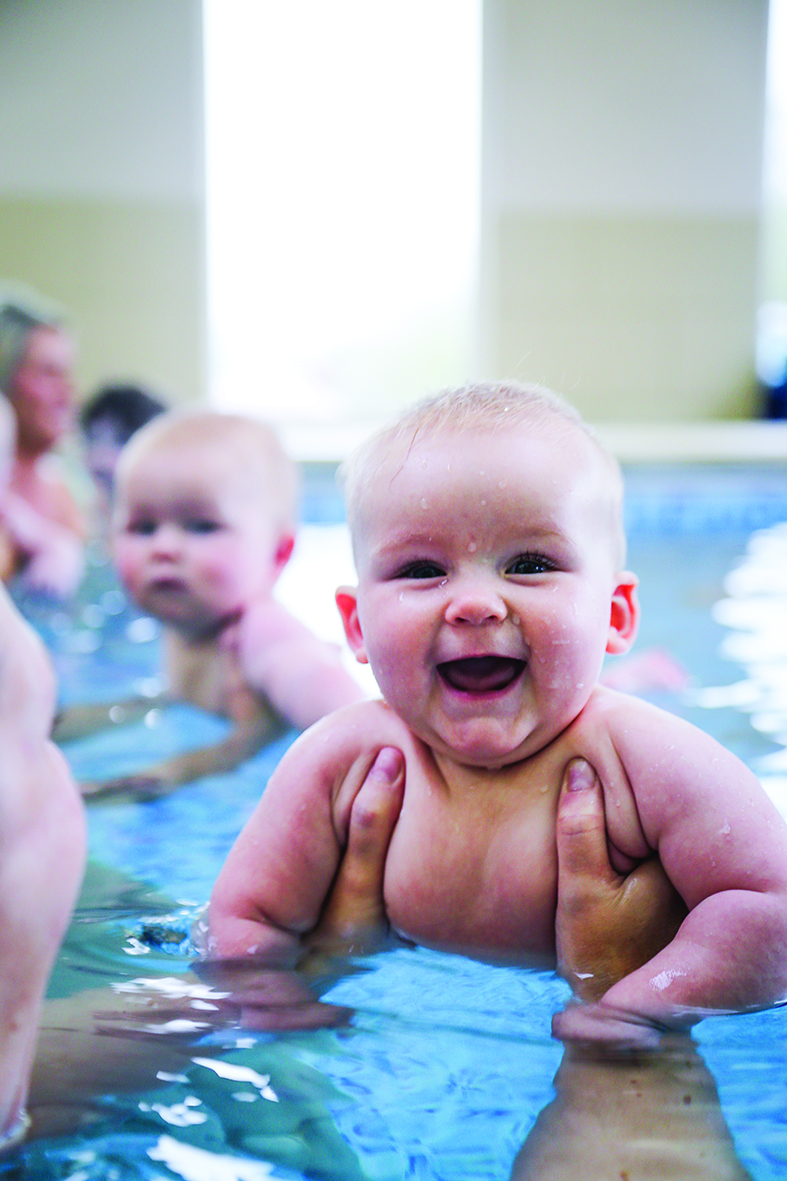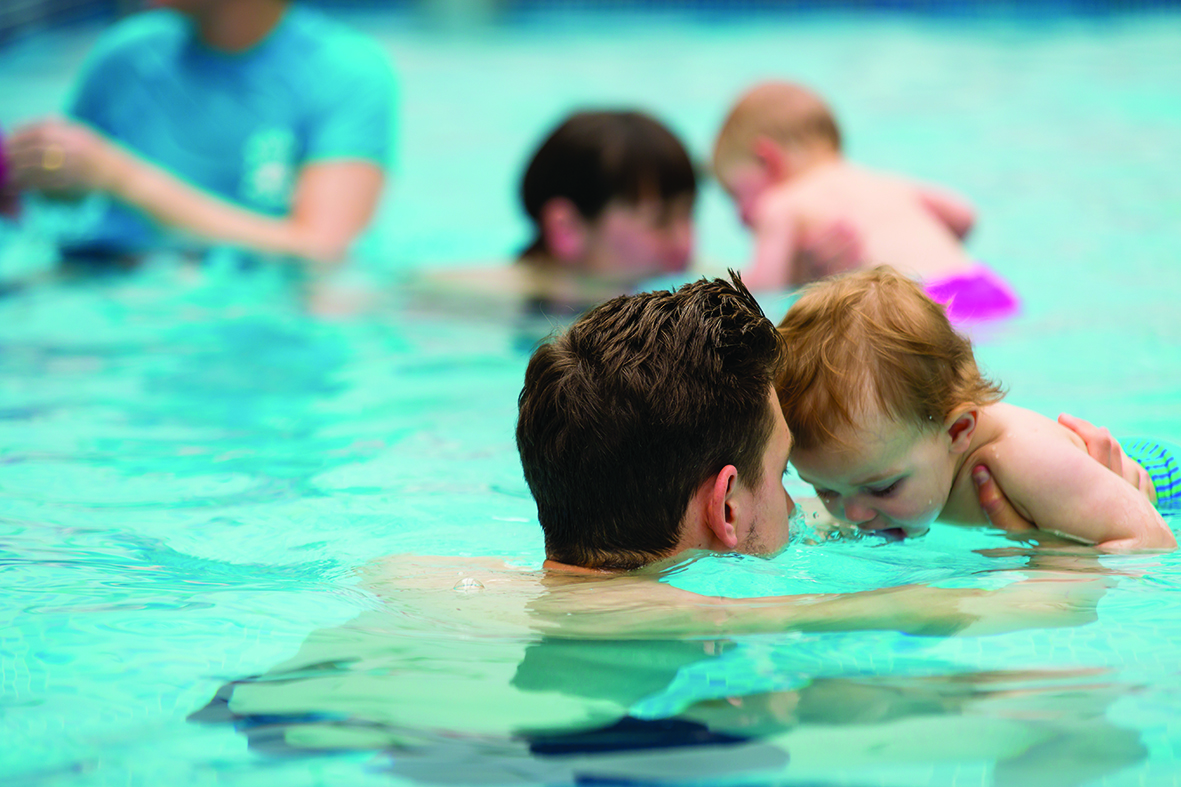
Ask DadPad, Being a Dad, Guest Blog
Ask DadPad: How do I avoid passing on my own fear of water to my little ones?
Posted on 4th October 2024
If you’re thinking of starting attending baby swimming classes with your little one – or just simply taking them swimming – that’s a fab idea! It’s a great way to get to know your baby, and have some one-on-one time together. It will help you to strengthen your bond with baby, and give your partner some time to herself.
However, if you’re conscious that you’re not the most confident around water, you might be worried about doing this, in case you inadvertently pass on your own fears to your baby.
With that in mind, we spoke to our good friend and baby swimming expert, Ali Beckman – Director at Puddle Ducks Swim School and President of the Swimming Teachers’ Association – to write a blog for dads who have this concern…

Aquaphobia, the fear of water, can bring a wave of strong and terrifying emotions, and being gripped with these feelings when responsible for a child can be overwhelming enough to prevent many parents taking their child swimming. There is, however, a high percentage of parents prepared to push through this fear to ensure their child learns the vital life skill of being able to swim and be safe around water.
Passing the fear of water to a child is common and even the most brave-faced dad who – above the water’s surface – says “I love swimming!”, is often the same dad who is paddling like mad under the water, wishing he was somewhere else! An article from Child Mind Institute states that: “It can be very difficult to communicate a sense of calm to your child when you are struggling to cope with your own anxiety.” My advice therefore is to try to overcome your own sense of fear before you take your child to lessons…
Do your research
Firstly, it’s really important to do your research when choosing the swim school. Overcoming aquaphobia starts with reassurance, so there are questions you should consider asking, for example:
- Are all instructors qualified in both teaching swimming and lifesaving?
- Do the instructors attend regular continual professional development training?
- Have all instructors completed a DBS check and have insurance?
Whilst these questions are not related to swimming per se, they should help to give you the reassurance that your instructor is suitably trained and will understand aquaphobia and will therefore have the patience to support you and your child.

What are you worried about?
Next is understanding your own fears and concerns. Have you had a negative experience in and around water? Do you not like the swimming pool environment? Have you never learnt to swim?
If you don’t like swimming pool environments, take some time to visit the swimming pool where lessons will be taking place. It’s advisable to do this on your own, so you are not distracted – find out if the swim school allow you to access the venue when lessons are taking place, to give you some reassurance. Can you go with a friend to a local pool, without your child, so you can fully focus on your confidence?
Don’t try to swim – you are taking your child to a lesson so there should be no expectation (unless you want to) to swim with your child. Chances are that you are going to be walking around the pool, holding your child, and your feet will remain firmly on the floor at all times. Once you realise that you will be walking rather than swimming, that should give you the confidence to attend lessons.
Going under…
In the 20 years of teaching babies and children at Puddle Ducks, I’ve learnt that underwater activities seem to be the area which concerns most dads. It’s therefore important to understand the swim school’s policy on this.
Forced submersion is not an acceptable practice but there are many swim schools who still deliver this style of underwater activities. The Swimming Teachers’ Association has a Baby Swimming Policy which reputable swim schools will adhere to, or they will have a similar policy of their own. Don’t be afraid to ask. When it comes to underwater activities, the child should lead – they should not be forced to go underwater.
When you’re there
When you have plucked up the courage to take your child swimming, relax, smile and don’t hold onto your child too tight – they pick up on body tension very easily and a tense parent can result in a tense child.

Some key tips to bear in mind are as follows:
- Make sure the teacher knows your concerns;
- Ask for patience and understanding, and inform the teacher that you’ll be taking the lesson at your own pace;
- Don’t consider taking your feet off the floor;
- Stay low in the water – standing tall can lead to you becoming unbalanced and losing your footing;
- Practice blowing bubbles, bringing your chin down to the surface of the water. Breath control plays a huge part in confidence practices; and
- Use toys to play with your child and focus on them, their enjoyment and their time. It’s amazing how quickly we forget our concerns when we play.
More importantly, enjoy spending quality time with your child and feel proud that you are giving them access to a life skill.
Further reading and references:
Child Mind Institute (2024) How to avoid passing anxiety on to your kids [online].
STA (2016) Baby Swimming Policy [online].
You can also find more great advice from Ali on the benefits of baby swimming and how to build water confidence in your little ones in this other blog post that she wrote for us a few years ago: Baby Swimming with Puddle Ducks.
For more information on Puddle Ducks:
- Website: https://www.puddleducks.com/
- Twitter: https://twitter.com/PuddletheDuck
- Facebook: https://www.facebook.com/puddletheduck/
- Instagram: https://www.instagram.com/puddleduckshq/
- YouTube: https://www.youtube.com/c/puddleducks

